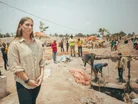Safeguarding Congo’s Economically Vital Cobalt Miners

Cobalt is a silver-grey metal with ‘super-properties’ that make it pivotal to the manufacture of a welter of economically important products.
It resists oxidation and corrosion at high temperatures, is strongly ferromagnetic, even at high temperatures, and is both hard wearing and heat resistant.
This makes it a key component in superalloys, used to make parts for gas turbine engines and rocket engines. It is also used to produce powerful magnets used in motors, generators, and magnetic resonance imaging (MRI) machines.
But it is its use in lithium-ion batteries – for electric vehicles (EVs) laptops, smartphones and other rechargeable electronic devices – that is the main driver of demand. Cobalt helps increase battery lifespan, which in the drive towards cleaner energy makes it crucial.
Cobalt is not found as a free, or ‘native’ metal, like gold and copper, but rather in a chemically combined form in ores, including cobaltite, erythrite and skutterudite.
The Democratic Republic of Congo (DRC) is the world's leading source of cobaltite ore, with major deposits found in the Katangan Copperbelt region of the country, which is rich in copper-cobalt deposits.
Underground mining is the most common method for mining cobalt from hard-rock deposits like those found in the DRC. For shallow and lower-grade cobalt deposits, open-pit or surface mining techniques are used.
Jamie Wallisch of Assent – the supply chain sustainability platform – visited Kolwezi, in southern DRC, to explore responsible mineral sourcing in the cobalt supply chain. Wallisch is a Regulatory and Sustainability Expert at Assent.
Fair Cobalt Alliance focus on artisanal mining
She was representing Assent as part of the Fair Cobalt Alliance (FCA). The FCA offers cobalt supply chain stakeholders a ‘pre-competitive environment’ for collaboration. Pre-competitive collaboration is where companies engaged in the same industry join forces to address a pain point. Its goal is to strengthen and professionalise DRC's artisanal cobalt mining sector, and to contribute to the economic development of its mining communities.
The FCA delegation comprised 30 people, from government institutions and manufacturers from multiple industries.
“Life is far from easy in the DRC,” says Wallisch. “It is riven with conflict, hardship and disorganisation, especially in the mining sector. Because it is the world’s main supplier of cobalt, this makes it a pinch point when it comes to sustainability issues.
“We are reliant on cobalt and on the miners in the DRC,” she says. “The FCA offers people across the cobalt supply chain opportunities for collaboration, to help strengthen and professionalise the DRC’s artisanal cobalt mining sector and contribute to local economic development at large.”
The FCA’s trip to DRC was a bid to better understand what is happening in artisanal and large-scale cobalt mines. Artisanal mining is where a small-scale miner works independently of a mining company. Such mining accounts for approximately 30% of DRC’s cobalt production.
“It is dangerous work that is sometimes illegal and in some cases can involve the use of child labour,” says Wallisch. “Most of the people working in these mines are from extremely poor rural areas and are trying to make a living, and most of these mines are very rudimentary in terms of the tools and methods they use.”
Organisations like the FCA work with local governments and manufacturers on an international scale to help improve such operations. Its aim is to educate communities on safer and better mining practices, while empowering local leadership in the artisanal mining sector.“
Locally led investment vital for cobalt mining communities
While visiting artisanal mines in Kolwezi, Wallisch saw first-hand how locally led investment has a positive societal impact on mining communities.
She visited a community where a women’s group was working to redirect finances away from mining and towards education opportunities at a local school.
“It was eye-opening to see how partnerships can serve the vision of the community rather than trying to direct it for them,” she said
Wallisch added that, while financial investment is vital for societal improvement, manufacturers whose minerals are being sourced can also support the needs of cobalt mining communities.
“Through more engagement at a local level, complex manufacturers can better understand how to make impactful investments in these communities and spur future change. This means understanding where raw minerals come from and paying close attention to smelters in the supply chain.”
She added: “Companies looking to prove responsible mineral sourcing with a focus on strong ESG reporting should seek evidence of what is happening at the local community level.”
Extended Mineral reporting Template ‘gold standard’
To this end, the Extended Minerals Reporting Template (EMRT) is the international gold standard for outlining data that manufacturers need to focus on when measuring the ESG impact of their mineral sourcing.
“To collect that data it’s important to have a software solution to engage suppliers with the EMRT and validate information,” says Wallisch. “It’s also vital to educate suppliers about responsible sourcing so they can support sustainability goals across the entire supply chain, down through to the raw mineral extraction and smelting tiers.”
Assent automates EMRT outreach and tracks data collection, making it easier to identify supply chain sustainability risks.
“We also provide education about cobalt and conflict minerals, in addition to expert services for additional supplier screening,” says Wallisch. “We dig deeper into supplier data to see into human rights, child labour, and environmental risks so that complex manufacturers can start to address them.”
**************
Check out the latest edition of Mining Digital, a BizClik brand

